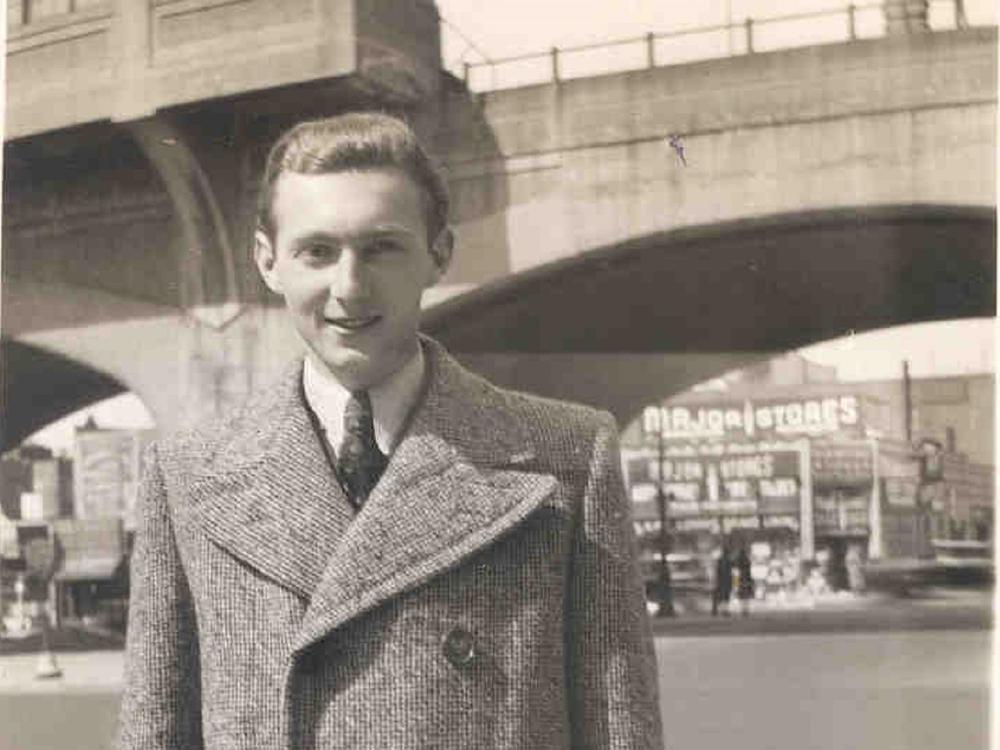Section Branding
Header Content
Forensic musicologists race to rescue works lost after the Holocaust
Primary Content
There's something elfin and even a little mischievous about the 102-year-old man who goes by Walter Arlen. The composer lives in a house near the ocean in Santa Monica, Calif., with his husband of 65 years. But he was born in Austria, in 1920, as Walter Aptowitzer. He grew up in a cosmopolitan cradle of music and high culture: Vienna before the war.
"I grew up in an atmosphere of great joy, as far as I was concerned," says Arlen, whose grandfather founded a large department store — the Warenhaus Dicther — in 1890. "And it grew and grew, because he was a very good businessman. And there was always music, because my grandfather believed in having music in the store. And he was the first one in Vienna who had loudspeakers installed all over the store."
His grandfather paid a young woman to sit by a phonograph all day and switch out records. The same music would be heard on every floor. The Aptowitzers lived in an apartment above the store, and by age five, young Walter had learned the words to all of the songs. His aunts would stick the child up on the store counter and ask him to sing.
His mother played piano, his uncle played fiddle, and he was eight when his parents took him to his first opera: Tosca, by Puccini.
"It bowled me over," he says. "That was the beginning of my wanting to be a composer."
The budding musician took piano lessons and sang in school. One day, his teacher had him dress up as Franz Schubert for a classroom celebration of the composer. He was praised for his talent and encouraged to write music. It was a happy childhood — "until Hitler came, and that's when it changed overnight," he says. "That was in 1938. Up in the air, the sky was full of airplanes. That was the occupation of Austria."
Aptowitzer was 17. His father was imprisoned by the Nazis and his mother was placed in a mental hospital. The boy responded by writing a melancholy song based upon a poem, titled "Es geht wohl anders." The title, in English, translates as Things turn out differently.
Aptowitzer escaped Austria and moved in with relatives in Chicago. Many others in his family were not so lucky: His grandmother died at the Treblinka extermination camp, and his father was taken to Dachau. His mother later died by suicide. In Chicago, Aptowitzer changed his name to Walter Arlen. (He is not related to "Over the Rainbow" composer Harold Arlen.) Arlen staved off depression by writing music. He won a prize in a song cycle contest and became an assistant to the American composer Roy Harris.
Arlen pursued his musical studies at UCLA, worked as a driver for Igor Stravinsky and, before long, was hired as a classical critic for the Los Angeles Times. I also write for the LA Times, but had never heard of Arlen until I was introduced to him by Michael Haas — a musical historian who arranged for Arlen's work to be recorded along with many other Jewish composers. For decades, Arlen's music remained in his desk drawer.
Among the recently recorded work is an oratorio, "The Song of Songs," based on the ancient Jewish love poem and composed by Arlen in the early 1950s.
"It is music that could only have been composed by a Viennese composer uprooted and transplanted to America, trying to work out all of his issues," says Haas, who authored the book Forbidden Music about Jewish composers banned by Hitler.
Even though most of Arlen's music was written after the Shoah, Haas says it belongs to this unique — and uniquely traumatic — place and time. "You know, these horrible things that he had to witness and live through and just the stories he has to tell about just trying to get out of Austria, and the things that happened to him and to his family. The only way he could deal with it was to write music ... and then shove it in the desk drawer," Haas says.
In 2006, Haas co-founded the Exilarte Center for Banned Music in Vienna, which locates, preserves and presents music lost during the Holocaust. The impetus began when Haas, a Grammy-winning classical producer for Decca Records, recorded music by Kurt Weill — the German Jewish emigré who wrote "The Threepenny Opera."
"I kept stumbling across names of other composers who were just as famous as Kurt Weill," Haas says. He points to the Jewish composers who fled Hitler's Europe and found success in Hollywood.
Erich Wolfgang Korngold, for example, was a classical prodigy who escaped Austria in the 1930s and achieved fame scoring Errol Flynn swashbucklers such as The Sea Hawk. But Haas began to discover an entire hidden world of composers who either died during the Holocaust, or became exiles. They either gave up music or — like Walter Arlen — wrote music that no one ever heard.
"The more we recorded," says Haas, "the more we suddenly discovered that the music had been, to some extent, also deliberately suppressed after the war — not because the composers were Jewish, but because the music did not represent the kind of post-war, anti-Fascist statement that society felt was crucial in re-educating, you know, publics after the war."
He points to the music of the late Robert Fürstenthal — who also left Vienna when he was 17, and whose desk-drawer compositions forever sounded like the glory days of his Austrian childhood.
"He was the accounts auditor for the U.S. Navy, for heaven's sakes, in San Diego," says Haas. "You can only imagine a more different place to Vienna. I said, 'Robert, why did you write in the style of Hugo Wolf in the 1980s, 1990s, early 2000s?' And he said: 'When I compose, I return to Vienna.' "
The forensic musicologists at the Exilarte Center have rescued hundreds of works by these composers. They've also tracked down their heirs and estates — more than 30 estates all around the world.
Robert Thompson, president of Wise Music Group, refers to the Exilarte team as the "monuments men" of composers and manuscripts. "But I realized that the missing part of it was getting this music out into the world, so that it could be performed," Thompson says. "We spent several months talking to them about how this could work, how we could be of help as a publisher to disseminate all this music."
Wise Music Group, which owns the historic publishing company G. Schirmer, partnered last year with Exilarte to help resurrect this forgotten and exiled music in public concerts. Publishing royalties go to the Exilarte project, and composer royalties to the families and estates. Or, in the case of Walter Arlen — who expects to turn 103 this July — the composer himself.
"I think he's our newest and our oldest living composer," says Thompson.
Over the decades, Arlen composed some 65 works — much of it vocal. It's music trapped in the amber of his memory, music of a Vienna he dearly loved and was forced to leave. Professionally, Arlen distinguished himself as a critic. So how would he have reviewed his work?
"If I hadn't liked it, I wouldn't have written it," he says.
And if he hadn't survived, we never would have heard it.
Copyright 2023 NPR. To see more, visit https://www.npr.org.



